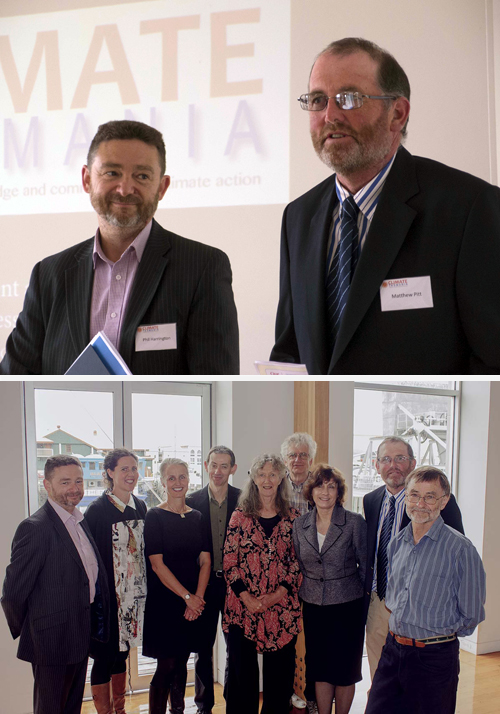The Hodgman government seems to want to go it alone on climate policy. That’s not a good idea. [9 December 2014 | Peter Boyer]
Coincidentally, on World Environment Day this year Tasmania’s energy minister Matthew Groom introduced legislation to abolish the Tasmanian Climate Action Council.

TOP: Phil Harrington (left) and Matthew Pitt, Climate Tasmania co-conveners. BOTTOM: The Climate Tasmania team with Lesley Hughes (third from right): (LtoR) Phil Harrington, Jess Fehely, Jan McDonald, James Risbey, Margaret Steadman, John Hunter, Matthew Pitt, Chris Harries. Absent: Nick Towle. PHOTOS Chris Harries, Michael Harries
The TCAC ceased to exist when the bill got vice-regal assent on 11 September, the infamous date on which another institution came crashing down in New York. That also was pure coincidence.
Led first by the University of Tasmania’s Kate Crowley and then by Macquarie University ecologist Lesley Hughes, the TCAC had steadily built a reputation for solid achievement over six turbulent years in which national climate policy changed direction several times.
Given the new task of gathering data from a huge array of sources to inform policymakers, the council did well to produce detailed, ground-breaking analyses of Tasmania’s emissions profile and avenues for cost-effective mitigation and adaptation.
In his two-minute speech to open the parliamentary debate, Groom said the bill delivered on a commitment to save money by cutting boards and committees. Later, in response to a question, he also revealed the “important” savings from killing off “this piece of bureaucratic architecture”.
Considering that Lesley Hughes, who is based in Sydney, had to fly to Tasmania several times a year, and given what it costs to send a politician to an out-of-state meeting, one might think these “important” savings amounted to millions of dollars. Half a million at the very least.
But the full outlay for the committee in its final year, 2013-14, including remuneration for nine members and all their expenses, amounted to the princely sum of $152,000.
Taking account of salary, office accommodation and other costs, that total would barely pay for a single mid-level public servant, let alone a parliamentarian or a political minder. Let alone a minister. The TCAC’s top-level professional expertise came at a bargain-basement price.
The House of Assembly took 2½ hours to pass the bill, but only because four Green and Labor MPs took up speaking time to oppose it. With just one dissenting voice (Rob Valentine, Hobart), the Legislative Council to its shame took a mere 38 minutes to decide we didn’t need the TCAC.
Some MPs claimed Tasmania was “insignificant” on the world climate scene. This is nonsense. Climate change is everyone’s responsibility, and leadership can come from any quarter, Tasmania included. That should include our state’s parliament, by the way.
Except for the handful of dissenters, no-one in either house was interested in how the group differed from internal advisers, or the value of bringing together specialist knowledge to provide independent advice at arm’s length from government. This was a classic parliamentary snow job.
To its credit the government kept the highly-effective Tasmanian Climate Change Office. But this small internal body is directly answerable to government and cannot call it to account.
I’m revisiting all this, three months after the TCAC died, because in Hobart last week Leslie Hughes (at her own expense) officiated at the launch of a body seeking to fill the gap it left behind.
Climate Tasmania brings together recognised experts in agriculture, climate science, economics, energy markets, environmental education, law, public health and public policy, most of them former TCAC members, who aim to continue the council’s work on a voluntary basis.
They will produce an annual scorecard of Tasmania’s progress in cutting emissions and try to engage with the Hodgman government to secure a low-carbon development strategy for the state.
They will be contacting state and local government, business and the community to raise awareness of climate issues and help identify solutions. Next year they will convene a series of public events seeking community input into their priorities.
The Hodgman government tried going it alone on another front, forestry. With the forest agreement torn up and hostilities resuming, the industry now looks in danger of complete collapse. The government would be ill-advised to adopt the same do-it-yourself approach to climate policy.
That approach led the Abbott government to axe the Climate Commission and sideline the Climate Change Authority. Killing off the TCAC was depressingly familiar. Both governments have signalled a dislike for advisory groups that don’t follow their script.
Groom’s assertion that the TCAC is giving way to “sensible, practical action” is troublingly complacent. The government continues to need information to ensure the right practical measures are chosen and properly targeted, and it needs broad community support to implement them.
• Climate Tasmania members include environmental lawyers Jan McDonald and Jess Feehely, climate scientists John Hunter and James Risbey, medical doctor Nick Towle, environmental educator Chris Harries and Margaret Steadman, former head of Sustainable Living Tasmania. It is headed by two co-conveners, Matthew Pitt, a Derwent Valley farmer, and Pitt & Sherry economist Phil Harrington. More information about the new group can be found at ClimateTasmania.org.
